Khaled al-Jeratli | Yamen Moghrabi | Hussam al-Mahmoud
In the face of the hardships and tragedies tracked by the Syrian people, the political opposition bodies and unities appeared to be an absent element in the scene with no effectiveness; such a role affected Syrians’ confidence in the opposition and reduced its appeal as a political representative.
The files of refugees’ voluntary return that neighboring countries are pushing towards, the deportation campaigns, the return of the Syrian regime to the Arab League, and the racist and discriminatory rhetoric used against refugees in some countries, leading to hate incidents and attacks based on identity, all of these important issues were neglected by opposition institutions except for brief, late statements that do not address the problem, do not provide a solution, and are devoid of confrontation with those who caused the problem itself.
In this file, Enab Baladi discusses with analysts and scholars the reasons for the opposition’s inability to seize any opportunities suitable for political exploitation and its preoccupation with its internal files, coinciding with major changes in the Syrian file at various levels.
Discord at the wrong time
On September 12, the General Assembly of the Syrian Opposition Coalition (SOC) elected Hadi al-Bahra as its new president during its 68th regular session.
Al-Bahra held several political positions in the institutions and political bodies of the Syrian opposition after 2011.
Two members of the SOC told Enab Baladi from inside the election hall that al-Bahra was elected as head of the Coalition after elections by the General Assembly, on Tuesday, September 12, to succeed Salem al-Meslet.
The second presidential candidate, Haytham Rahmeh, became the Secretary-General of the Coalition, while the members approved three Vice-Presidents: Abdel Majeed Barakat, Dima Moussa, and Abdel Hakim Bashar.
The sources confirmed that part of the members of the SOC boycotted the elections in protest against the imposition of Hadi al-Bahra as its president, and in objection to the “authorization” mechanism in the elections.
Hadi al-Bahra is now the head of the Syrian Opposition Coalition and Joint Chairman of the Syrian Constitutional Committee. He previously served as president of the Coalition in 2014 and then as a member of the political body of the Coalition.
On August 14, an email was leaked from the Vice President of the Syrian Opposition Coalition (SOC), Ruba Habboush, in which she expressed resentment to her colleagues in the SOC about the voting mechanisms adopted to choose who would occupy the presidency and other bodies.
Events quickly developed, as the National Coalition for Syrian Revolutionary Forces or the Syrian Opposition Coalition held a meeting to hold Habboush accountable, who said that she had been subjected to “threats of accountability” from political blocs within the Coalition.
Habboush told Enab Baladi at the time that changing the voting mechanism is “a small part of what she is demanding to be corrected in the SOC, along with other members.”
In her letter, Habboush likened the SOC elections mechanism to that in regime-held areas, where the personal cards of participants are collected by one person who elects whoever he wants in their place without consulting the voting card holder.
On August 23, another email attributed to Habboush was leaked, the authenticity of which was verified by Enab Baladi, in which she demanded changing the voting mechanisms and holding SOC’s meetings in a public manner as an attempt to build new trust with the Syrians and correct the mistakes and pitfalls that it suffers from.
These leaks indicate deep disagreements among the SOC members, which is facing criticism for its failure to keep pace with the Syrian revolution, its weakness, separation from reality and people, and its negligence and unconvincing performance in international politics regarding the Syrian file, especially with the rapid changes since last May in particular, when Bashar al-Assad returned to occupy the Syrian seat in the Arab League and the announcement of the “Jordanian Initiative” to normalize relations with the regime according to a step-for-step approach, leading to anti-regime protests in southern As-Suwayda governorate, and the tribes revolt in Deir Ezzor against the Kurdish-led Syrian Democratic Forces (SDF) and its affiliated Deir Ezzor Military Council.
Disagreements over the distribution of positions
Disagreements between the SOC members are not new, and since its founding in November 2012, it has witnessed problems, some of which have come to light.
With the clear decline in its political role, the criticism directed at the Coalition for affiliation to the countries supporting it more than affiliation to the revolution itself, the demands of the Syrians in areas outside the regime’s control, and the SOC’s inability to keep pace with the successive political developments in the Syrian file, it is logical to ask about the reasons for the current dispute and its timing, according to observers.
The Vice-President of the Coalition, Ruba Habboush, told Enab Baladi that the most recent disagreements in the corridors of the Coalition are not only related to the voting or election process but also to the working mechanism and the way in which a specific group takes over positions and distributes them among themselves, in addition to political quotas by bringing in people who are unable or unwilling to work, and excluding and marginalizing those who disagree with them.
Hosam al-Hafez, head of the legal office of the High Negotiations Commission (HNC) between 2016 and 2017 and a member of the Syrian opposition negotiating delegation in 2014, told Enab Baladi that the accumulated disagreements in the Coalition were caused by “the deterioration of the Coalition’s situation in terms of structure and internal system,” and the method of members’ interaction with each other and with the political body, in addition to relying on directives coming from supporting countries.
The SOC consists of five councils, which are the Provincial Representative Council (9 representatives), the Turkmen Council (9 representatives), the Kurdish National Council (11 representatives), the Syrian Tribes and Clans Council (5 representatives), and local councils for northern Syria (6 representatives).
There are two political movements: the Syrian National Movement, represented by two members, one of whom is the head of the Negotiation Commission, Badr Jamous, and the National Future Movement, represented by two members as well.
In addition to 15 independent figures (including Ruba Habboush and Hadi al-Bahra), there is the Assyrian organization with two representatives, the Association of Kurdish Independents with three representatives, and the Muslim Brotherhood group with two representatives, while the military representation has 15 members.
|
The method of reaching the presidency of the Coalition is always linked to external factors, while internal factors are almost non-existent. Hosam al-Hafez – Former head of the legal office of the High Negotiations Commission |
On August 5, the Syrian Negotiations Commission (SNC) elected Badr Jamous as its president for the second time during its regular meeting held in northern Syria, in the presence of components from inside and outside Syria.
Jamous was elected as the new president of the SNC in a meeting held virtually in June 2022, succeeding Anas al-Abdah, also the former president of the Coalition.
Salem al-Meslet, the former president of the SOC, was elected in July 2021, succeeding Nasr al-Hariri, who served as the second President of the Negotiations Commission.
Al-Hafiz believes that the recent disagreements come about distributing the remaining places only to take center stage, and to occupy seats without any political or actual value.
Habboush told Enab Baladi that the Coalition, as an institution that represents the Syrian revolution and within a healthy state, must achieve competition for the presidential seat and within clear and minimally democratic frameworks.
“This means that whoever applies for a position must present a clear project and an integrated plan that includes the Syrian interior and international relations and to be applicable by a team capable of carrying out the tasks assigned to it,” she added.
The leaked emails of Habboush included her request to hold public meetings with the SOC members as an attempt to restore trust between the key opposition body and the Syrians.
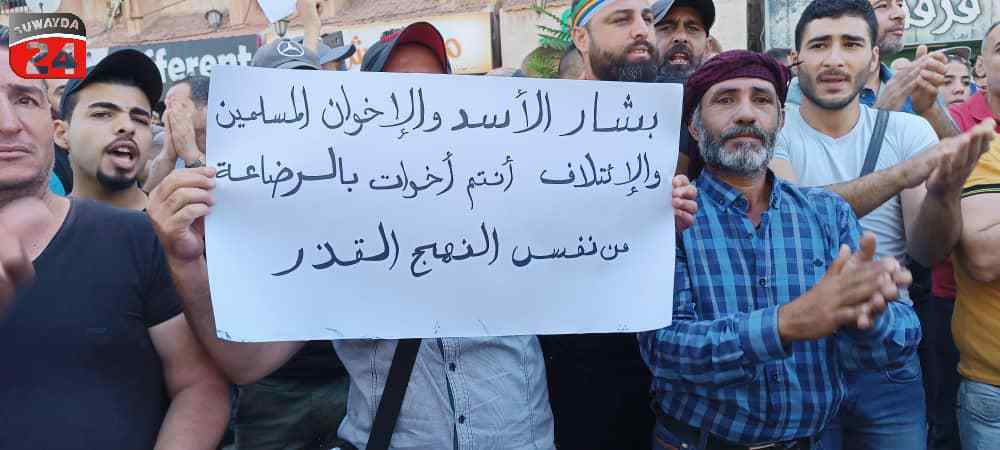
A protestor raises a banner criticizing the Opposition Coalition (SOC) during the As-Suwayda demonstrations in August 2023 (Suwayda 24)
Gap is widening between Coalition and Syrians
The Coalition appears to represent a large segment of Syrian society at the first assessment, which includes different races, ethnicities, and sects distributed across Syria.
But the disagreements and loss of influence in the political file with the regional countries at least, and the weakness of its presence on the ground, reveal that this representation through councils, movements, independent figures, and military representation has no connection to reality.
The former head of the Coalition, al-Meslet, was previously beaten by angry demonstrators during his visit to the border city of Azaz in Aleppo countryside last January.
Several demonstrations also witnessed an attack on the Coalition and its members, the latest of which was the demonstrations in the southern city of As-Suwayda that have been ongoing since last August, with banners raised rejecting its representation of the Syrians.
The Vice President of the Coalition, Habboush, believes that this reality in the relationship between the Coalition and the Syrians can be changed if there is a real will for change within it and things are restored to normal.
Habboush called for the need for the General Assembly to take its role (as the highest authority in the SOC) and for the Coalition to open up to the Syrians and represent them in a new way with components that have real weight on the ground, according to a well-thought-out plan and steps within a timetable.
|
According to what is happening now in the process of changing chairs, excluding others, and the arrogance practiced by those controlling members and people, (the Coalition) will remain as a closed political club controlled by a few people who distribute tasks as they want. Ruba Habboush – SOC Vice President |
This is not the first time that Habboush has referred to the representation of the councils and movements that currently constitute the Coalition for segments of Syrian society, as she said in a previous interview with Enab Baladi on August 18 that the Coalition is a group of political blocs, movements, parties, and national personalities, which existed when it was founded.
But it is assumed that each of these components represents a section of the Syrian people, while there are blocs that have dissolved and whose existence we have not heard of for more than six years, while political components were separated through what was called “reform” with the same pretext.
On the other hand, about a decade after the SOC founding, there have become many unions, student organizations, and party institutions that have masses and real human blocs, but the Coalition does not count on the introduction of any new blocs even though they have weight on the ground, according to Habboush.
For his part, al-Hafiz told Enab Baladi that the Coalition lost contact with reality a long time ago, and the blocs in it only express the people themselves by their names, not the popular extensions in the various regions, whether under the control of the regime or outside it and even the members who represent certain blocks do not represent them, they only belong to them.
The Coalition lost its political elite who worked in the political field before the Syrian revolution in 2011 and who were members of the “Damascus Declaration” or long-standing political parties, and the influential blocs were excluded as part of what was called the “reform process” that led to the dismissal of political figures within the “political rivalry” framework, according to al-Hafiz.
Despite all these problems that the SOC suffers from, the public disagreements, its loss of contact with the Syrian mass base, its inability to deal with the variables of the political file, and despite the demands of many Syrian political figures to dissolve the Coalition and form a new political body capable of managing the current stage, it is not expected that this move will happen soon.
According to al-Hafiz, the Coalition will remain standing because it represents a need for some international bodies, despite abandoning its leadership seat a long time ago and losing any connection to influence events.
The Coalition is not a popular representative
The director of the Idrak Center for Studies and Consultations, Basil Haffar, told Enab Baladi that the Syrian opposition is a body that arose within the circumstances of the revolution, and its institutions were formed within complex circumstances with international, local, and external interactions, but in the end, it is opposed to the regime and has tried to provide a “satisfactory performance” for the Syrian audience, while evaluations vary greatly about its performance.
The researcher specializing in political affairs added that the Syrian opposition is not representative in the popular sense, as it did not come through electoral means or through a broad official and popular mandate.
Haffar believes that the opposition emerged during the events, like many other activities, such as activists and institutions, as it gained a certain international legitimacy over the years, during a certain period of time, and obtained limited support within the Syrian demonstrations during the first years of the Syrian revolution.
The scholar added that the opposition does not claim popular representation, but on the other hand, there is a general impression among Syrians that it is not providing a performance that is equivalent to the size of the sacrifices and the size of the Syrian movement in general.
It is possible that evaluations of the Syrian opposition will be negative, according to Haffar, but it cannot be neglected that the opposition ultimately deals with different parties and other countries, and therefore, it cannot move with the freedom with which parallel entities move and speak that do not give priority to considerations related to recognition of their legitimacy.
The head of Idrak Center added that the above does not negate the shortcomings of the Syrian opposition and its official institutions regarding many Syrian issues, but they are basic details.
Foreign relations, “Proxy War”
Dr. Khaled Khoja, a Syrian-Turkish politician who led the SOC in 2015, told Enab Baladi that 2016 witnessed a shift in Turkish policy towards Russia and Iran, partly from lining up with Western countries against the regime.
Khoja added that this period witnessed the establishment of re-bridging relations with the regime itself, and this change in the Turkish position had an impact on the composition of the Syrian opposition itself.
Everyone who opposed the Turkish approach with the “Russian solution” was excluded from the opposition or resigned as a result of his feeling that the path had deviated, according to him.
|
The Turkish turn affected the Syrian opposition, but as for the continuous talk about the Coalition’s loyalty to Turkey, it is due to several factors, most notably the internationalization of the Syrian issue and turning it into a game in which four regional countries participated. Khaled Khoja – Former head of the Syrian Opposition Coalition |
Khoja believes that the military presence of Russia, the United States, Iran, and Turkey in Syria has turned the Syrian parties to the dispute into “proxies,” meaning the war in Syria has become a “proxy war.”
In turn, Rahaf Aldoughli, Ph.D. in political science and lecturer at Lancaster University, says that the conflict in Syria is based on the intersection and complexities of the regional scene.
Aldoughli also describes the Syrian war as a “proxy war,” as four regional countries are deployed in Syria alongside local military militias that control the land.
|
The traditional opposition, including the (Coalition) and the (Interim Government), are ineffective due to their decision being dependent on Turkey, the lack of independence of the opposition’s economic resources, and the inability to activate its role in governance inside Syria. Rahaf Aldoughli – PhD in Political Science |
Khaled Khoja believes that the agents of the international parties in Syria, the regime, the Syrian opposition, both military and political, and the US-led Syrian Democratic Forces (SDF) have turned into “secondary players” on Syrian territory.
In effect, their political and military movements became limited and depended on the state of agreement or conflict between the main players (international parties), according to the former SOC head.
Khoja said that this structure, which has been evident in the Syrian file since 2016, must be taken into account when talking about the “dependence of the Syrian parties,” as there are no large margins that allow their movements.
At the same time, the local Syrian parties move within the permitted space or field, but this space varies between the parties. For example, the SDF or the Kurdish-led Autonomous Administration have a greater margin of movement, and the Syrian regime also has a similar space, which is many times the space of movement in front of the Syrian opposition, whether in its political or military wing, including Hayat Tahrir al-Sham (HTS), according to Khoja.
He also pointed out a weakness point within the opposition, which is the presence of an “undeclared veto” over the representation of the Sunni Arab majority of the revolution, which the supporting countries have been committed to for years, meaning that the scope of movement is limited to the northwestern regions and within certain borders.
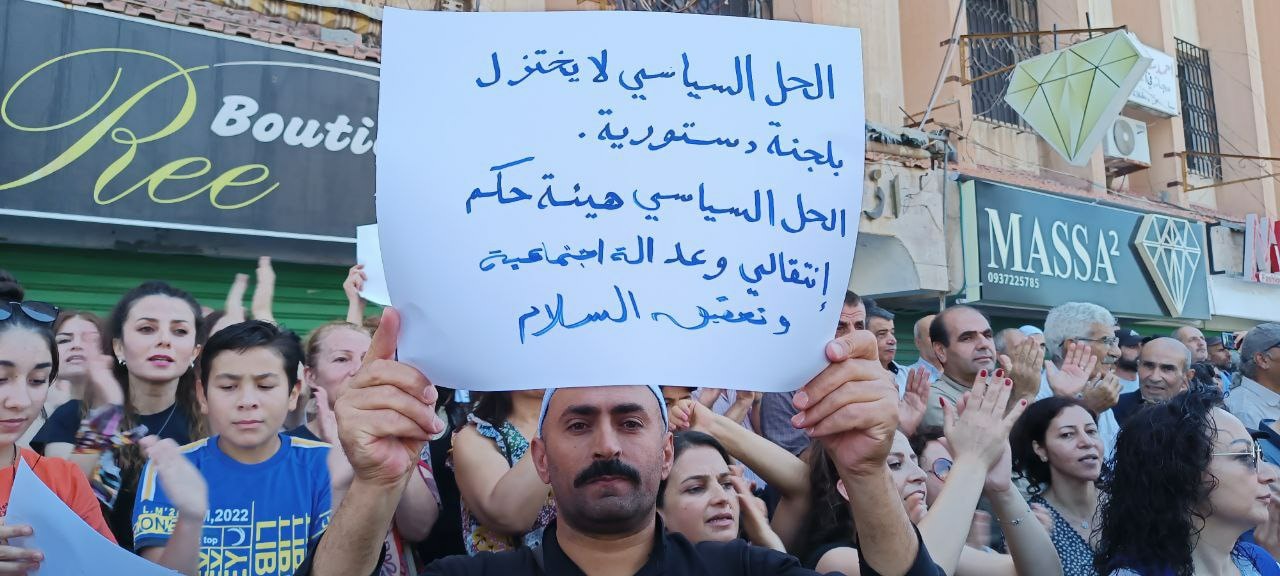
A Banner with a critical phrase against the Syrian Constitutional Committee raised by the protestors of As-Suwayda city in August 2023 (Suwayda 24)
Political opposition and military groups
Early last year, the US Treasury Department imposed sanctions on factions of the Turkey-backed Syrian National Army (SNA) accused of human rights abuses it described as “grave” in the northern enclave.
It was not the first of its kind, as it had previously imposed sanctions on another faction that is still carrying out its usual activity in northern Aleppo, within the administration areas of the Syrian Interim Government of the Coalition.
The US sanctions may not have an effective impact outside the cadres of the faction itself, but they have significant representation in the political Coalition entity, which has a limited relationship with Washington and other European countries that complain about violations by the factions themselves.
Khoja told Enab Baladi that the relationship between the political and military sides of the Syrian opposition was never strong, to the point that coordination between the parties was at a minimum.
The former head of the SOC believes that since the establishment of the military factions, various international support has come in many ways, both materially and morally, for the armed military opposition.
On the other hand, the SNA units or the armed factions in northwestern Syria felt “superiority” over the political representatives, in addition to the fact that the force present in the Syrian field represented a weight for the military side, not the political one.
The previous factors made the political opposition weak since the beginning of its establishment, and international support contributed to the military’s superiority over politicians.
|
After getting rid of the national factions (formerly known as the Free Army), the armed factions turned into what is known today as the (National Army). Its function changed from a military entity that supported and continued the revolution to an army that enforced by force of arms the decisions of the main player countries in the Syrian issue. Khaled Khoja – Former head of the SOC |
A “formal” and complex representation
Political analyst Dr. Aldoughli believes that the relationship of the National Coalition with military representation within the Coalition still revolves around “formal representation,” as the military factions that play the role of the external actor responsible for structuring the military factions have no real representation.
In fact, the opposition, both political and military, does not play an effective role in managing the areas under its control in northwestern Syria or even in governance there.
Political researcher Basil Haffar told Enab Baladi that the military factions have partial representation in the Coalition and the Interim Government through the Ministry of Defense with a large bloc, and this bloc includes more than a third of its membership seats.
The large representation of the military within the political opposition gave the military aspect an important dimension, and therefore, the military factions cannot be bypassed in any way during the Coalition’s activities, according to Haffar.
The director of the Idrak Center added that the current situation in the Syrian scene within the corridors of the political opposition must be subject to gradual rationalization.
The goal is to try to return things to normal, but the real problem lies with the regime, which, along with its allies, is still bombing the “liberated areas,” dragging the region into an armed conflict again, he says.
Given the regime’s attempts in this context, it is not possible to limit the armed bloc within the Syrian political scene if the regime continues its attempts at armed confrontation because any restriction or weakening of the military bloc means making room for the regime and its allies to expand within opposition-held areas.
The previous equation, according to Haffar, imposes a state of complex relationship between the political scene and the military scene within the Syrian opposition.
It also imposes the presence of entities, blocs, and individuals and the continuation of a broad military presence that is greater than the needs of the region, as it only needs approximately 20 or 30% of the number of armed men currently included in the official accounts of any country in the world, but the regime’s practices keep the situation as it is.
“Harmful” institutions
In the face of a clear decline in the political presence of the Syrian opposition, at the expense of the regime’s efforts to implant itself in the international community again through more than one portal, the opposition did not intend to form a circle of allies at odds with the Syrian regime, specifically Ukraine, which has been repelling a Russian invasion since February 24, 2022, which was supported by the Syrian regime and entered into a state of hostility with Kyiv to please Moscow.
On June 30, 2022, Ukraine severed its relationship with the Syrian regime after it recognized the independence of the Donetsk and Luhansk regions and imposed a trade embargo and sanctions on entities and individuals from the Syrian regime.
Later, it canceled joint cooperation agreements with the regime’s government in the economic, commercial, and technical fields, with the aim of “protecting its national interests,” and imposed sanctions on the head of the Syrian regime, Bashar al-Assad, the prime minister, Hussein Arnous, and the foreign minister, Faisal Mekdad, and it also sent aid to the areas affected by the earthquake in northwestern Syria outside the regime’s control.
All of these facts did not push the Coalition towards building a political relationship with a possible ally with an effective political presence at the international level. The Syrian-Ukrainian meetings were limited to the level of civil society organizations, the most recent of which was last August, when a Syrian delegation representing several civil organizations visited Ukraine and participated in several activities, including the third summit of the Crimea Platform, where representatives of countries from all over the world met.
The Syrian delegation attended the Crimea Platform to share messages of solidarity with Ukraine, where representatives of the delegation met with the Ukrainian President, Volodymyr Zelensky, during the summit and spoke about “fighting impunity in Ukraine and Syria.” They affirmed their solidarity with Ukraine and its people, in contrast to the Syrian regime’s position in support of Russia.
Dr. Yahya al-Aridi, a Syrian academic and former spokesman for the Syrian opposition, told Enab Baladi that the problem with the opposition institutions is not that they are useless but rather that they are “harmful” institutions that work against the Syrians, and the result of their work is not zero but rather has a negative impact.
“The external observer is waiting for a position on issues, files, and positions that are sensitive to the Syrians, and the opposition today is giving negative signals to the outside world that lie in its ineffectiveness and silence,” he said, adding, “There is no official opposition, but the people have spoken, and it is the title, and these institutions do not express it.”
Regarding ways to get out of the situation of the opposition with its current bodies, al-Aridi believes that the process is linked to three broad lines: the future and nature of the peaceful movement in southern Syria, the arrival of the message of the south to the rest of the regions of Syria, and the movements taking place in the eastern Deir Ezzor governorate.
As a result of these internal revolutionary transformations, expert academic figures may be selected to form a general body for the revolution that will work to establish a constituent assembly, resulting in several bodies, including political, that will operate for a limited period before heading to general elections in which the Syrians determine the nature of the relationship between them and who will manage the next stage.
|
The current opposition institutions can be used as titles and institutions, not as individuals. These bodies must be held responsible and held accountable. What happens on the ground today will determine the future of political bodies, as there is no turning back from the protests, and the regime itself has thwarted all golden opportunities to restore itself and stay in power. Dr. Yahya al-Aridi – Syrian academic and former opposition spokesman in the Astana process |
if you think the article contain wrong information or you have additional details Send Correction
النسخة العربية من المقال
-
Follow us :












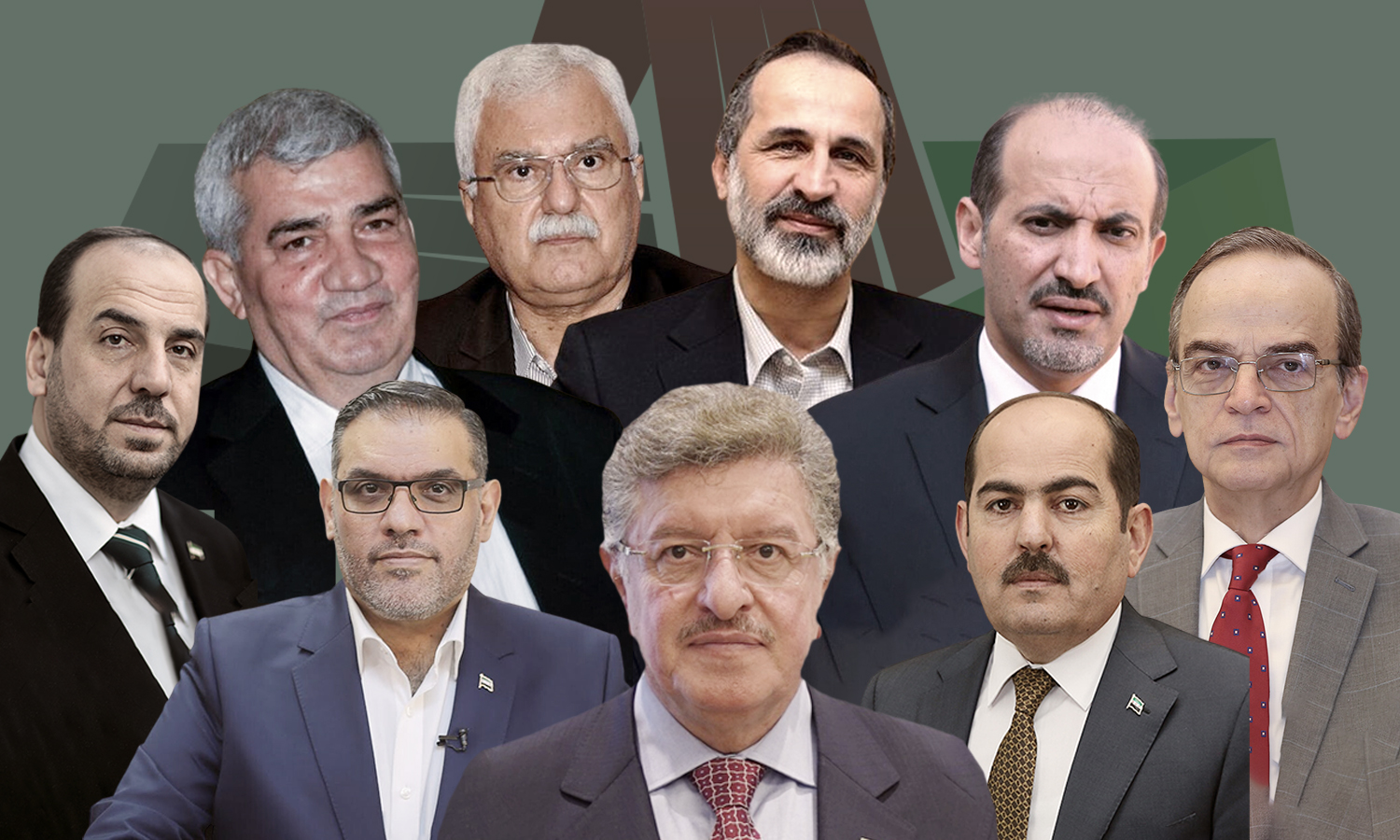
 Syrian political figures led the Opposition Coalition (SOC) (Edited by Enab Baladi)
Syrian political figures led the Opposition Coalition (SOC) (Edited by Enab Baladi)





 A
A
A
A
A
A



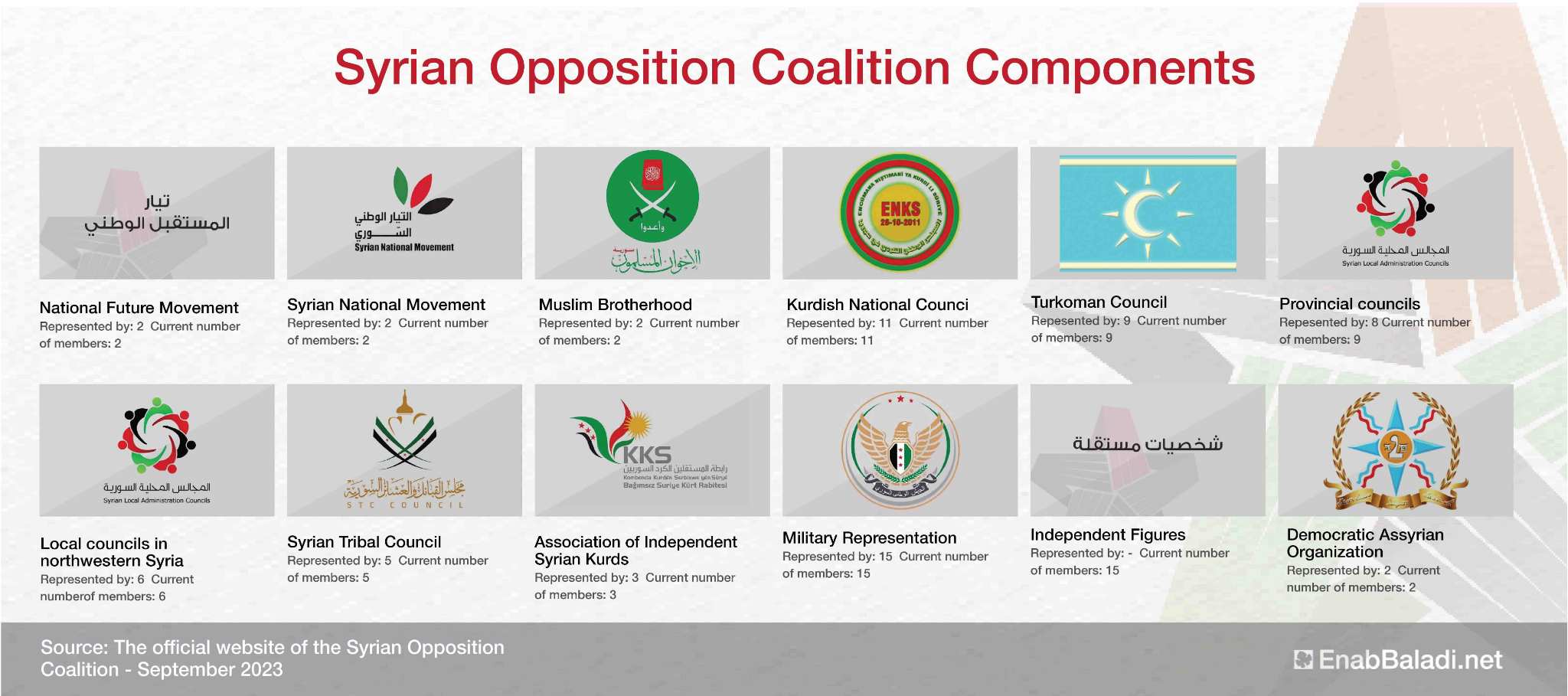
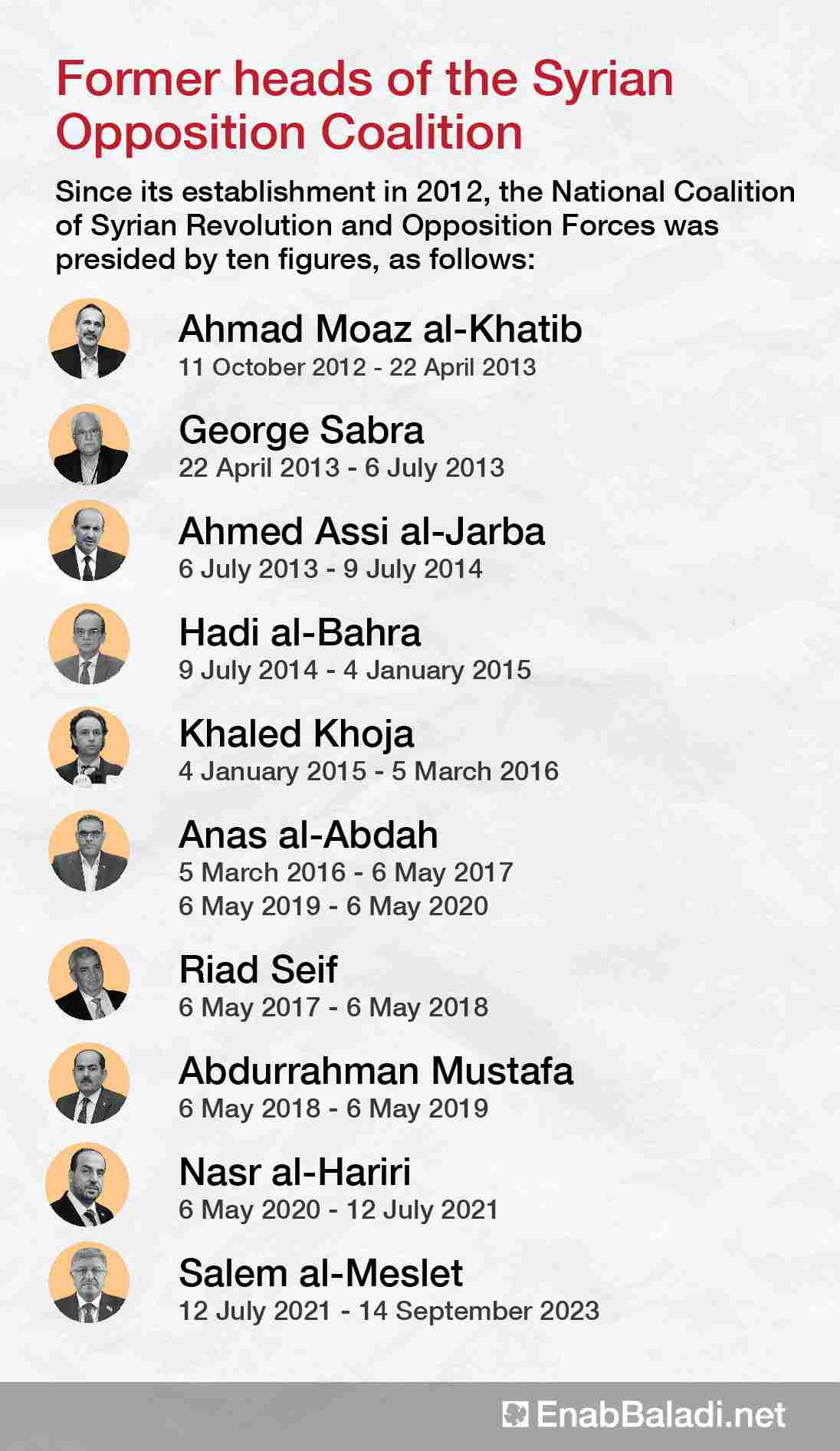



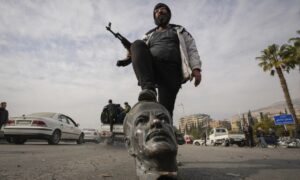
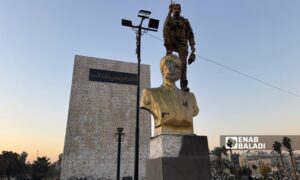

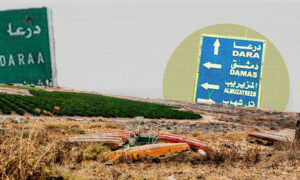
 More In-Depth
More In-Depth